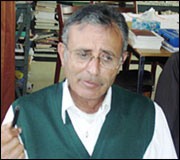 Moroccan novelist, poet, essayist & sociologist Abdelkebir Khatibi passed away on Monday morning in Rabat. Khatibi was a major force in contemporary Moroccan writing. There are only two of his books available in English at this point, namely Love in Two Languages, translated by Richard Howard (& that one is in print probably only because Jacques Derrida’s book Monolingualism of the Other is a response to this essay by Khatibi) and The Splendor of Islamic Calligraphy, co-edited with Mohammed Sijelnassi (a large, splendid book indeed, about what lies at the core of Arabic culture, art & poetics, namely its deep investment in calligraphy).
Moroccan novelist, poet, essayist & sociologist Abdelkebir Khatibi passed away on Monday morning in Rabat. Khatibi was a major force in contemporary Moroccan writing. There are only two of his books available in English at this point, namely Love in Two Languages, translated by Richard Howard (& that one is in print probably only because Jacques Derrida’s book Monolingualism of the Other is a response to this essay by Khatibi) and The Splendor of Islamic Calligraphy, co-edited with Mohammed Sijelnassi (a large, splendid book indeed, about what lies at the core of Arabic culture, art & poetics, namely its deep investment in calligraphy).
There is thus a dire need to translate some of the core works by this incontournable Maghrebian author: a good place to start would be the novels La mémoire tatouée (1971) and La Blessure du nom propre (1974), the collection of poems Le Lutteur de classe à la manière taoïste (1976), the essay “Le sionisme et la conscience malheureuse” (in: Vomito blanco, Collection 10/18, 1974), and the superb essay collection Maghreb pluriel (Denoël, 1983).
I have been reading Khatibi since I first came across his work in the early seventies: it is essential work for anyone wanting to understand not only contemporary Morocco, but also the whole of post-colonial North Africa. Writing about the Maghreb, I have several times quoted the following from Love in Two Languages:
Yes, I spoke, I grew up around the Only One and the Name, and the Book of my invisible god should have ended within me. Extravagant second thought that stays with me always. The idea imposes itself as I write it: every language should be bi-lingual! The asymmetry of body and language, of speech and writing - at the threshold of the untranslatable.
Which leads him to say in another essay that what would indeed be extraordinary would be to write “à plusieurs mains, à plusieurs langues dans un texte qui ne soit qu’une perpétuelle traduction” - to write with/in several languages a text that would be but a perpetual translation. A thought close to my heart & mind, one that I find essential for trying to think a nomadic or diasporic poetics commensurate with the complexicity of this, our twenty-first century world
pierrejoris.com/blog